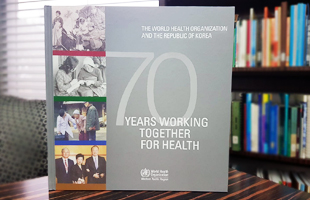
WHO/K. Cabali
The World Health Organization (WHO) and the Republic of Korea have today launched a commemorative book to celebrate their fruitful and robust partnership. Titled 70 Years Working Together for Health – the World Health Organization and the Republic of Korea, the book reviews seven decades of cooperation between the Republic of Korea and WHO, and highlights key achievements and challenges in their joint quest to champion public health.
"It is a great pleasure to present this book, which chronicles the rich and complex history of WHO's partnership with the Republic of Korea," said Dr Shin Young-soo, WHO Regional Director for the Western Pacific. "This partnership began in the years just after the Second World War, before the formal establishment in 1948 of both the Republic of Korea and WHO."
The book features four chapters, which are:
- The origins of health services and WHO support in the Republic of Korea (1946–1960);
- Enhancement of public health services in the Republic of Korea in cooperation with WHO (1961–1979);
- Expansion of public health services in partnership with WHO (1980–1996); and
- From recipient to donor: transition of the Republic of Korea and support of WHO (1997–2016).
Each chapter includes six subsections: (1) historical background; (2) relations between WHO and the Republic of Korea; (3) WHO support for the Republic of Korea; (4) contribution of the Republic of Korea to WHO; (5) summary; and (6) biographies.
In the late 1940s, the health status of the Korean people was wretched. The health situation deteriorated even further during the Korean War from 1950 to 1953.
In a speech delivered at the First World Health Assembly in 28 June 1948, Choi Young-tae, First Chief Delegate of the Republic of Korea to WHO said, "My country is at present in a grave condition and expects great services which you may be able to perform for the improvement of Korea's health. …I hope this conference will enable to achieve its objectives, so that the health of everyone may be safeguarded by the activity of this international organization."
WHO quickly became a close ally of the Government of the Republic of Korea, supporting the establishment and expansion of public health services to improve the health of the Korean people.
WHO has provided substantial support to the Republic of Korea’s efforts to build public health services and develop human resources for health. The country, one of the world’s poorest in the late 1940s, has made remarkable socioeconomic and health gains over the years.
The Republic of Korea was the first country in the Region to transform from being an aid-dependent country to a donor country. The WHO country office in Seoul, which was established in 1962, closed in 2012, allowing resources to be dedicated to countries in greater need in the Western Pacific Region.
However, this did not end cooperation between the Republic of Korea and WHO. The country still relies on WHO for technical support in specific areas. Meanwhile, the Republic of Korea continues to be a major contributor to WHO's work – both in terms of financial contributions and the participation of Korean experts in regional and global health work.
"As always, WHO and the Republic of Korea will continue to work closely with other Member States towards our shared goal of attaining the highest possible level of health for all people," said Dr Shin.
